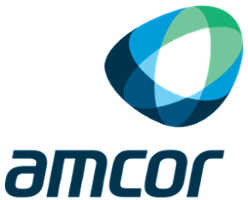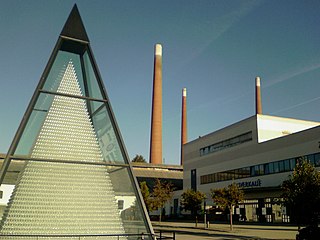Related Research Articles

ThyssenKrupp AG is a German industrial engineering and steel production multinational conglomerate. It resulted from the 1999 merger of Thyssen AG and Krupp and has its operational headquarters in Duisburg and Essen. The company claims to be one of the world's largest steel producers, and it was ranked tenth-largest worldwide by revenue in 2015. It is divided into 670 subsidiaries worldwide. The largest shareholders are the Alfried Krupp von Bohlen und Halbach Foundation and Cevian Capital. ThyssenKrupp's products range from machines and industrial services to high-speed trains, elevators, and shipbuilding. The subsidiary ThyssenKrupp Marine Systems also manufactures frigates, corvettes, and submarines for the German and foreign navies.

Samsonite International S.A. is an American luggage manufacturer and retailer, with products ranging from large suitcases to small toiletries bags and briefcases. The company was founded in 1910 in Denver, Colorado, United States.

Amcor plc is a global packaging company. It develops and produces flexible packaging, rigid containers, specialty cartons, closures and services for food, beverage, pharmaceutical, medical-device, home and personal-care, and other products.

Ball Corporation is an American company headquartered in Westminster, Colorado. It is best known for its early production of glass jars, lids, and related products used for home canning. Since its founding in Buffalo, New York, in 1880, when it was known as the Wooden Jacket Can Company, the Ball company has expanded and diversified into other business ventures, including aerospace technology. It eventually became the world's largest manufacturer of recyclable metal beverage and food containers.

Slazenger is a British sports equipment brand owned by the Frasers Group. The company was established as a sporting goods shop in 1881 by Ralph and Albert Slazenger on Cannon Street, London. Slazenger was acquired by Dunlop Rubber in 1959. Dunlop was acquired by BTR in 1985. Sports Direct acquired the business in 2004.

Sonoco Products Company is an American provider of diversified consumer packaging, industrial products, protective packaging, and packaging supply chain services and the world's largest producer of composite cans, tubes, and cores. The company was founded in 1889 as Southern Novelty Company with annualized net sales of approximately $7.3 billion. Sonoco has 19,900 employees in more than 335 operations in 33 countries, serving more than 85 nations. The company is headquartered in Hartsville, South Carolina, and is South Carolina's largest corporation in terms of sales.

Berry Global Group, Inc. is a Fortune 500 global manufacturer and marketer of plastic packaging products. Headquartered in Evansville, Indiana, it has over 265+ facilities across the globe and more than 46,000+ employees With $14+ billion in revenues in fiscal year 2022, the company is one of the largest Indiana headquartered company in Fortune Magazine’s ranking. The company changed its name from Berry Plastics to Berry Global in 2017.

The Simmons Bedding Company is an American major manufacturer of mattresses and related bedding products, based in Atlanta, Georgia. The company was founded in 1870. Simmons' flagship brand is Beautyrest. In addition to operating 18 manufacturing facilities in the United States and Puerto Rico, the company licenses its products internationally. According to a Simmons press release, net sales for 2005 were $855 million, and its revenue was $1.13 billion in 2007 and $1.228 billion in 2013. In 2011, Simmons ranked in third place among U.S. mattress manufacturers, with a 15.7 percent market share. In 2012, Simmons and its sister company Serta International were acquired by American private equity company Advent International. As of 2022, Simmons is a subsidiary of the American company Serta Simmons Bedding, LLC of Doraville, Georgia. On January 23, 2023, Serta Simmons Bedding filed for Chapter 11 bankruptcy.
Continental Can Company (CCC) was an American producer of metal containers and packaging company, that was based in Stamford, Connecticut.
Smurfit Kappa Group plc is a corrugated packaging company and paper-based packaging company based in Dublin, Ireland. It is listed on the London Stock Exchange and is a constituent of the FTSE 100 Index.
Griffon Corporation is a multinational conglomerate headquartered in New York City. The company conducts its operations through five subsidiaries: The AMES Companies, ClosetMaid, Clopay Building Products, and CornellCookson. Griffon has been publicly traded since 1961 and is listed on the New York Stock Exchange as a component stock of the S&P SmallCap 600, S&P Composite 1500, and Russell 2000 indices.

Zwiesel Kristallglas AG is a manufacturer of crystal glass located in Zwiesel, Germany.

Novar plc was an international building supplies group based in the United Kingdom. Novar was formed in 1921 as Metal Box Company from the coming together of several businesses and trades, including canning and printing. By the 1970s, it was a market leader in these fields. In the 1980s the company diversified into building supplies and at its peak consisted of 30 companies supplying products to the construction and DIY industries.

Private equity in the 1980s relates to one of the major periods in the history of private equity and venture capital. Within the broader private equity industry, two distinct sub-industries, leveraged buyouts and venture capital experienced growth along parallel although interrelated tracks.
Wesray Capital Corporation is a private equity firm focusing on leveraged buyout investments. The firm was founded by former US Secretary of the Treasury William E. Simon and former New Jersey Nets owner Ray Chambers.

The Diamond Match Company is a brand of matches and toothpicks, and formerly other wood products and plastic cutlery, that has its roots in a business started in 1853 by Edward Tatnall in Wilmington, Delaware. Ownership passed to William H. Swift and Henry Courtney who operated under the name Swift & Courtney and marketed their product as Diamond State Parlor Matches.

Fruehauf Trailer Corporation, previously Fruehauf Trailer Company (1918–1963) and Fruehauf Corporation (1963–1989), was an American company engaged in the manufacture and sale of truck trailers, and other machinery and equipment, with headquarters located in Detroit, Michigan. It was founded in 1918 in Detroit, after August Fruehauf created the semi-trailer and launched a new industry. The Fruehauf trailer company introduced revolutionary inventions to trucking and transportation with hydraulic dump trailers, bulk tanker trailers, and automatic fifth-wheel couplings among their more than one thousand patents, including the shipping container in 1956. Expanding across the country, Fruehauf had 16 plants and more than 80 distributorships for parts and service. Globally, the company expanded into Europe, South America, and Asia.

The Vollrath Company is an American company based in Sheboygan, Wisconsin that manufactures stainless steel and aluminum equipment and smallwares, and deep draw stainless steel items, for commercial and institutional foodservice operations.

RPC Group plc is based in the United Kingdom, and is one of Europe's largest supplier of plastic packaging. Its headquarters are in Rushden in Northamptonshire. It was listed on the London Stock Exchange until it was acquired by Berry Global Group Inc.
References
- 1 2 3 4 5 6 7 8 9 10 11 12 13 14 Heekin Can Inc., International Directory of Company Histories, Vol. 13. St. James Press, 1996. Retrieved from Funding Universe website, November 27, 2009
- ↑ "HEEKIN CAN YOTES FOR PURCHASE BID Approves Its Acquisition by Diamond International". The New York Times. 1964-12-08. ISSN 0362-4331 . Retrieved 2020-01-09.
- 1 2 William E. Simon, with John E. Caher A Time for Reflection: An Autobiography, Regnery Publishing, 2004. 352 pages. ISBN 0-89526-170-7, ISBN 978-0-89526-170-0. pp. 230-231
- 1 2 Archived 2010-09-17 at the Wayback Machine Ball Timeline, Ball Corporation website, accessed November 27, 2009
- ↑ "Ball agrees to acquire Heekin". UPI. 1992-12-02. Retrieved 2020-01-09.